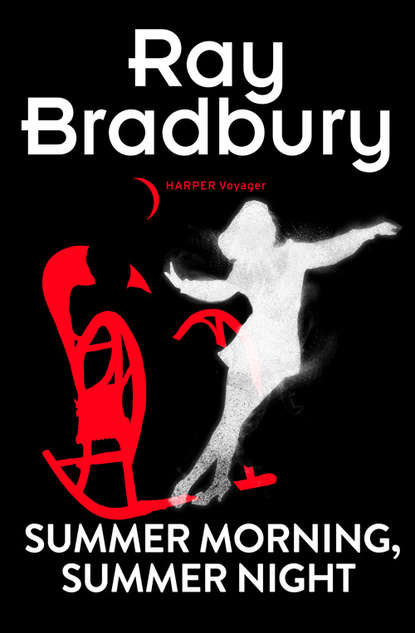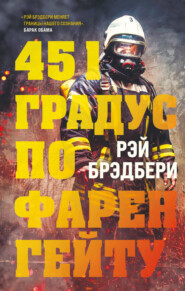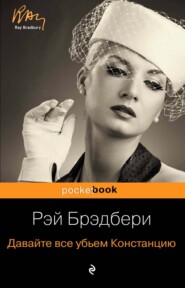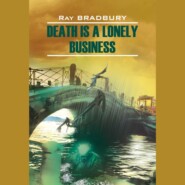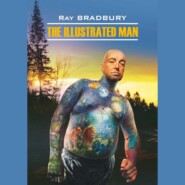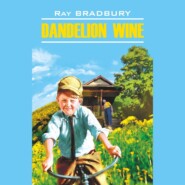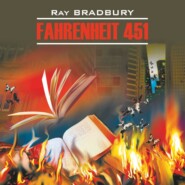По всем вопросам обращайтесь на: info@litportal.ru
(©) 2003-2024.
✖
Summer Morning, Summer Night
Автор
Год написания книги
2018
Настройки чтения
Размер шрифта
Высота строк
Поля
“Because.”
“Because why?”
“I hate to spoil your plans,” rustled grandma, chuckling. She gestured with her little vinegary head. “But while you people were worrying about getting Marianne married, I’ve been keeping tab on her. Seven days now I’ve been watching this young fellow, each day he came in his car and honked his horn outside. He must be an actor or a quick change artist or something.”
“What?” asked father.
“Yep,” said grandma. “Because one day he was a young blond fellow and next day he was a tall dark fellow, and Wednesday he was a chap with a brown mustache, and Thursday he had wavy red hair, and Friday he was shorter, with a Chevrolet stripped down instead of a Ford.”
Mother and father sat for a minute as if hit with hammers right behind the left ear.
At last father, his face exploding with color, shouted, “Do you mean to say! You sat there, woman, you say; all those men, and you—”
“You were always hiding.” snapped grandma. “So you wouldn’t spoil things. If you’d come out in the open you’d have seen the same as I. I never said a word. She’ll simmer down. It’s just her time of life. Every woman goes through it. It’s hard, but they can survive. A new man every day does wonders for a girl’s ego!”
“You, you, you, you, you!” Father choked on it, eyes wild, throat gorged too big for his collar. He fell back in his chair, exhausted. Mother sat, stunned.
“Good morning, everyone!” Marianne raced downstairs and popped into a chair. Father stared at her.
“You, you, you, you, you,” he accused grandma.
I shall run down the street shouting, thought father wildly, and break the fire alarm window and pull the lever and bring the fire engines and the hoses. Or perhaps there will be a late snowstorm and I shall set Marianne out in it to cool.
He did neither. The heat in the room being excessive, according to the wall calendar, everyone moved out onto the cool porch while Marianne sat looking at her orange juice.
All on A Summer’s Night (#ulink_decb3474-f74c-58c1-b89b-6bdc968571ca)
“YOU’RE GETTING TOO big for this!” Grandpa gave Doug a toss toward the blazing chandelier. The boarders sat laughing, with knives and forks at hand. Then Doug, ten years old, was caught and popped in his chair and Grandma tapped his bowl with a steaming spoonful of soup. The crackers crunched like snow when he bit them. The cracker salt glittered like tiny diamonds. And there, at the far end of the table, with her gray eyes always down to watch her hand stir her coffee with a spoon or break her gingerbread and lay on the butter, was Miss Leonora Welkes, with whom men never sat on backyard swings or walked through the town ravine on summer nights. There was Miss Leonora whose eyes watched out the window as summer couples drifted by on the darkening sidewalks night after night, and Douglas felt his heart squeeze tight.
“Evening, Miss Leonora,” he called.
“Evening, Douglas.” She looked up past the steaming mounds of food, and the boarders turned their heads a moment before bowing again to their rituals.
Oh, Miss Welkes, he thought, Miss Welkes! And he wanted to stab every man at the table with a silver fork for not blinking their eyes at Miss Welkes when she asked for the butter. They always handed her things to their right, while still conversing with people on their left. The chandelier drew more attention than Miss Welkes. Isn’t it pretty? they said. Look at it sparkle! They cried.
But they did not know Miss Welkes as he knew her. There were as many facets to her as any chandelier, and if you went about it right she could be set laughing, and it was like stirring the Chinese hanging crystals in the wind on the summer night porch, all tinkling and melody. No, Miss Welkes was cobweb and dust to them, and Douglas almost died in his chair fastening his eyes upon her all through the soup and salad.
Now the three young ladies came laughing down the stairs, late, like a troupe of orioles. They always came last to the table, as if they were actresses making entrance through the frayed blue-velvet portieres. They would hold each other by the shoulders, looking into each other’s faces, telling themselves if their cheeks were pink enough or their hair ringed up tight, or their eyelashes dyed with spit-and-color enough; then they would pause, straighten their hems, and enter to something like applause from the male boarders.
“Evening, Tom, Jim, Bill. Evening, John, Peter!”
The five would tongue their food over into their cheeks, leap up, and draw out chairs for the young belles, everyone laughed until the chandelier cried with pain.
“Look what I got!”
“Look what I got!”
“Look at mine!”
The three ladies held up gifts which they had saved to open at table. It was the Fourth of July, and on any day of the year that was in any way special they pulled the ribbons off gifts and cried, Oh, you shouldn’t have done it! They even got gifts on Memorial Day, that was how it was. Lincoln’s Birthday, Washington’s, Jefferson’s, Columbus Day, Friday the Thirteenth. It was quite a joke. Once they got gifts on a day that wasn’t any kind of day at all, with notes printed on them saying: JUST BECAUSE IT’S MONDAY! They talked about that particular incident for six months after.
Now there was a crisp rattling as they cut the ribbons with their fingernails which flashed red, and far away at the end of the tunnel of people sat Miss Leonora Welkes, still inching at her food, but slowing down until at last her fork came to rest and she watched the gifts exposed to the crystalline light.
“Perfume! With Old Glory on the box!”
“Bath powder, in the shape of a pinwheel!”
“Candy, done up in ten-inch salutes!”
Everyone said how nice it was.
Miss Leonora Welkes said, “Oh, how nice that is.”
A moment later, Miss Welkes said, “I’m all done. It was a fine meal.”
“Don’t you want any dessert?” asked Grandma.
“I’m choke-full.” And Miss Welkes, smiling, glided from the room.
“Smell!” cried one young lady, waving the opened perfume under the men’s noses.
“Ah! Said everyone.
Douglas hit the screen door like a bullet to a target, and before it slammed he had taken sixty-eight steps across the cool green lawn in his bare feet. Money jingled in his pocket, the remains of his firecracker savings; and quite a remains, too. Now he thudded his bare feet on the warm summer twilight cement, across the street to press his nose on Mrs. Singer’s store window, to see the devils laid in red round rows, the torpedoes in sawdust, the ten-inch salutes that could toss your head in the trees like a football, the nine inchers that could bang a can to the sun, and the fire balloons, so rare and beautiful, like withered red, white and blue butterflies, their delicate silk wings folded, ready to be lit and gassed with warm air later and sent up into the summer night among the stars. There were so many things to pack your pocket with, and yet as he stood there, counting the money, ten, twenty, forty, a dollar and seventy cents, precariously saved during a long year of mowing lawns and clipping hedges, he turned and looked back at Grandma’s house, at the highest room of all, up in the little green cupola, where the window was shut in the hottest weather, and the shades half drawn. Miss Welkes’ room.
In half an hour the kids would come like a summer shower, their feet raining on the pavement, their hands full of explosions, little adhesive turbans on their burned thumbs, smelling of brimstone and punk, to run him off in fairy circles where they waved the magical sparklers, tracing their names and their destinies in luminous firefly paths on the sultry evening air, making great white symbols that lingered in phosphorous after-image even if you looked down from your night bed at three in the morning, remembering what a day and what an evening it had been. In half an hour he would be fat with treasure, breast pockets bulging with torpedoes, his money gone. But—now. He looked back and forth between the high room in Grandma’s house, and this store window full of dynamite wonders.
How many nights in winter had he gone down to the stone public library and seen Miss Welkes there with the stamp pad at her elbow and the purple ink rubber stamper in her hand, and the great book sections behind her?
“Good evening, Douglas.”
“Evening, Miss Welkes.”
“Can I help you meet some new friend, tonight?”
“Yes’m.”
“I know a man named Longfellow,” she said. Or, “I know a man named Whittier.”
And that was it. It wasn’t so much Miss Welkes herself, it was the people she knew. On autumn nights when, for no reason, the library might be empty for hours on end, she would say, “Let me bring out Mr. Whittier.” And she went back among the warm stacks of books, and returned to sit under the green glass shade, opening the book to meet the season, while Douglas sat on a stool looking up as her lips moved and, half of the time, she didn’t even glance at the words but could look away or close her eyes while she recited the poem about the pumpkin:
Oh—fruit loved of childhood—the old days recalling,
When wood grapes were purpling and brown nuts were falling!
When wild ugly faces we carved in its skin,
Glaring out through the dark with a candle within!





